
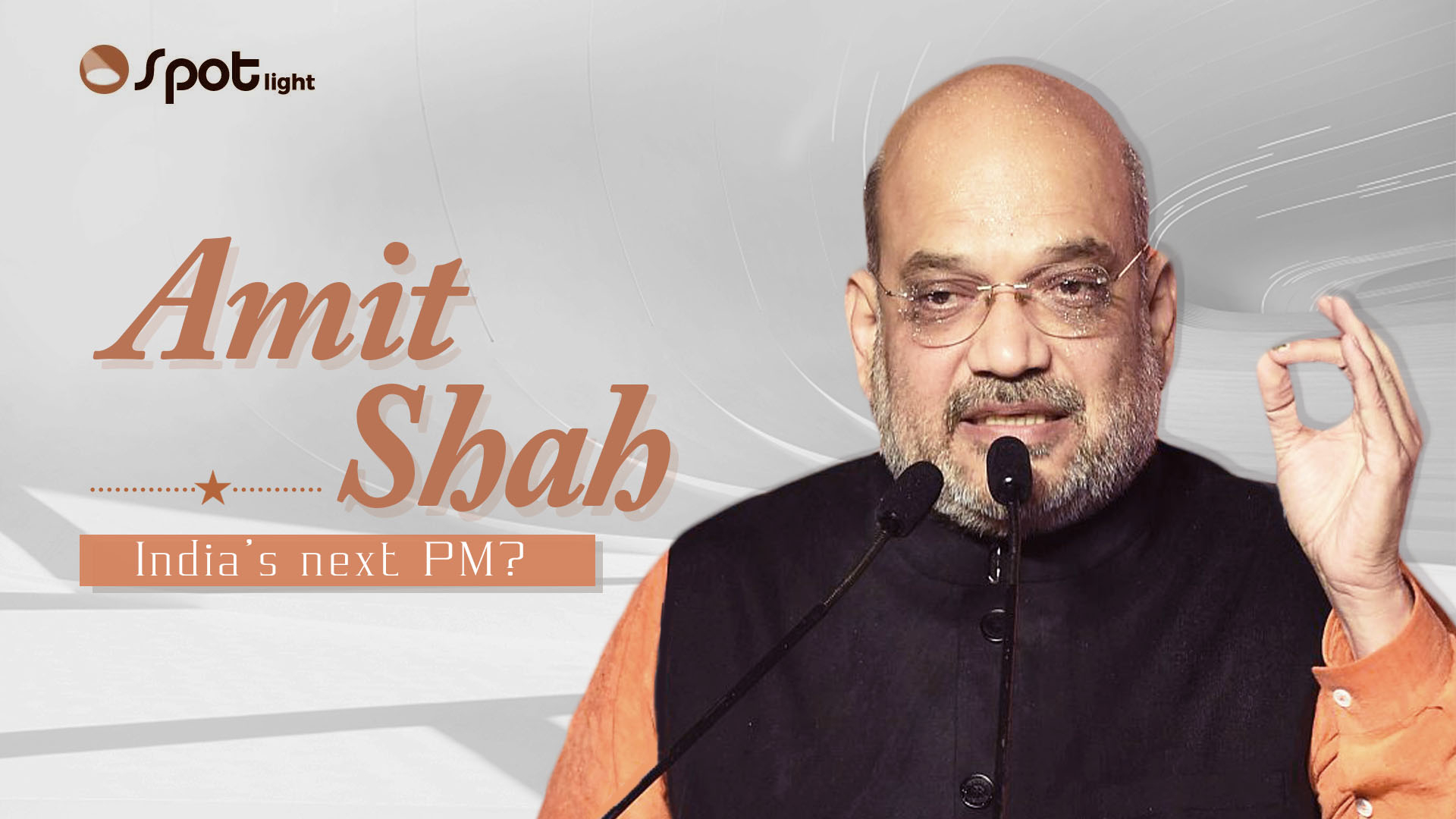
"I want to tell the people of Jammu & Kashmir (J&K) that we can find the final solution to the Kashmir issue only through the scrapping of Article 370, there is no other way," said the Indian Home Minister Amit Shah on August 5 while tabling the Jammu & Kashmir Reorganization Bill 2019 in the upper house of the Indian parliament.
The Indian government's dramatic and controversial decision to end seven decades of near-autonomy for Kashmir has thrust Shah, little known outside his own country, into the global spotlight.
The 54-year-old is the youngest-ever president of the ruling Bharatiya Janata Party (BJP) and is described by many as the modern-day Chanakya, an ancient Indian sage, who served during the Maurya Dynasty (322-187 BCE) and is still regarded as India's greatest strategist.
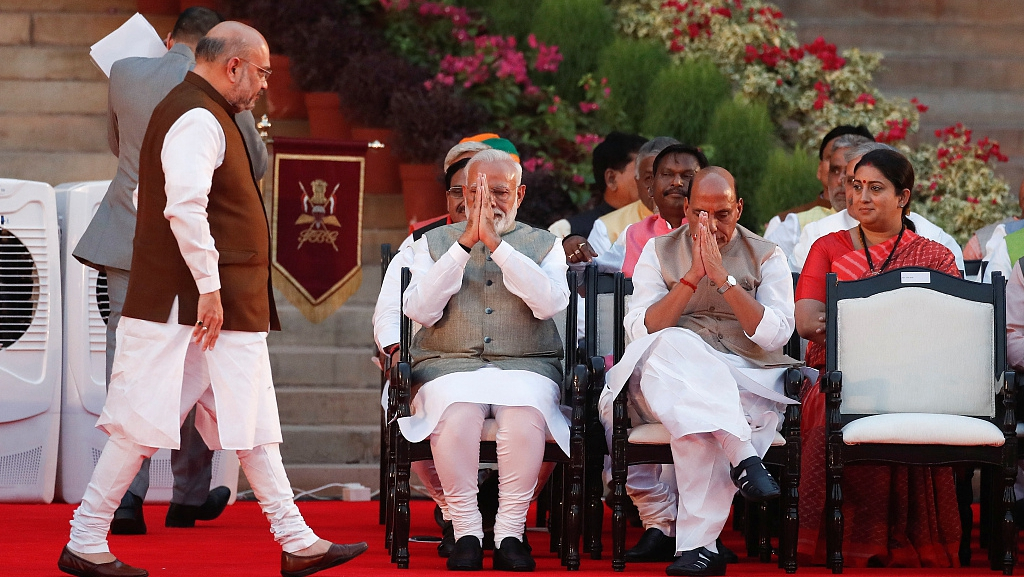
India's Prime Minister Narendra Modi greets BJP President and Indian Home Minister Amit Shah during a swearing-in ceremony at the presidential palace in New Delhi, India, May 30, 2019. /VCG Photo
The businessman-turned-politician has developed a reputation of being the power behind the throne, working on the front foot, taking unthinkable and tough decisions and devising winning tactics for the BJP that culminated in landslide victories for the party in the 2014 and 2019 general elections.
"A master strategist, a ruthless but brilliant politician who has emerged as the BJP's most successful and powerful president ever," said Neha Khanna, senior editor & anchor of Indian new channel NewsX who has covered Indian politics for 15 years, while describing Shah in an interview with CGTN Digital.
Marya Shakil, political editor of Indian news channel CNN-News18 who has covered Shah and the BJP for over a decade, told CGTN Digital, "It was Mr. Shah who spoke on behalf of the government in Rajya Sabha [upper house] on Article 370 as the home minister, the limelight was on him, the PM was present in both houses of the parliament when Shah gave the reply; there's enough evidence and optics to prove that they are in sync and in line with each other…Shah enjoys full faith of PM Modi."
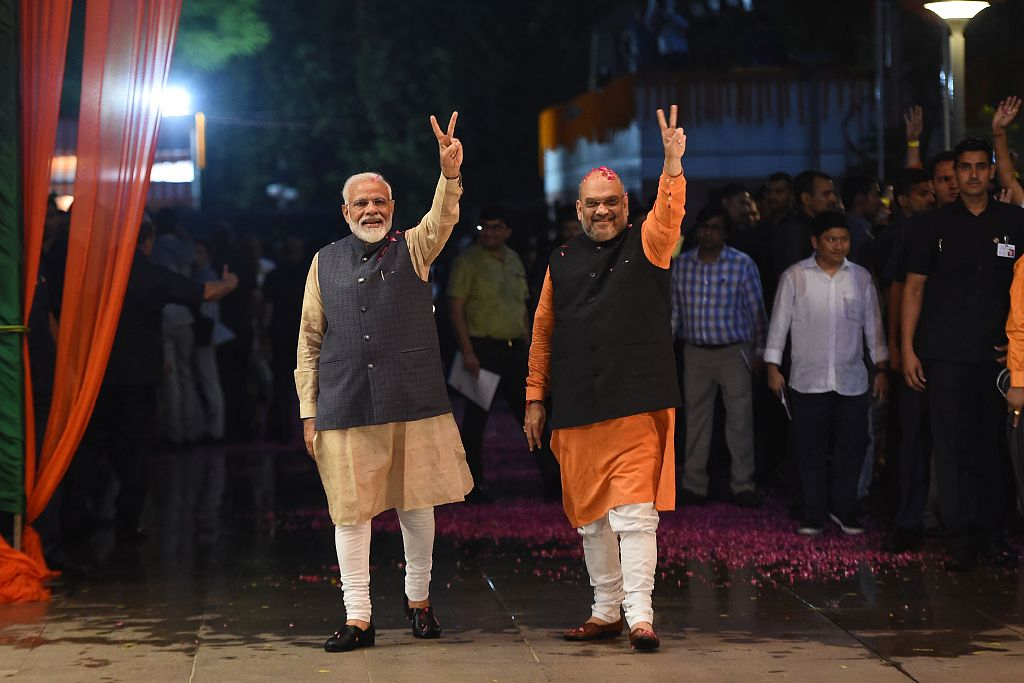
Indian Prime Minister Narendra Modi (L) and BJP President Amit Shah celebrate the victory in India's general elections, in New Delhi, May 23, 2019. /VCG Photo
Shah, the face of the government's decision to revoke J&K's special status, is often heard by journalists telling his party workers that the "success of a project depends on its secrecy."
That principle was strictly followed in the plan to abrogate the disputed Article 370. The move happened overnight with no discussion with Kashmiri leaders. Two former chief ministers were placed under house arrest, tourists and pilgrims were asked to leave, and an as yet unlifted curfew and communications blackout were imposed.
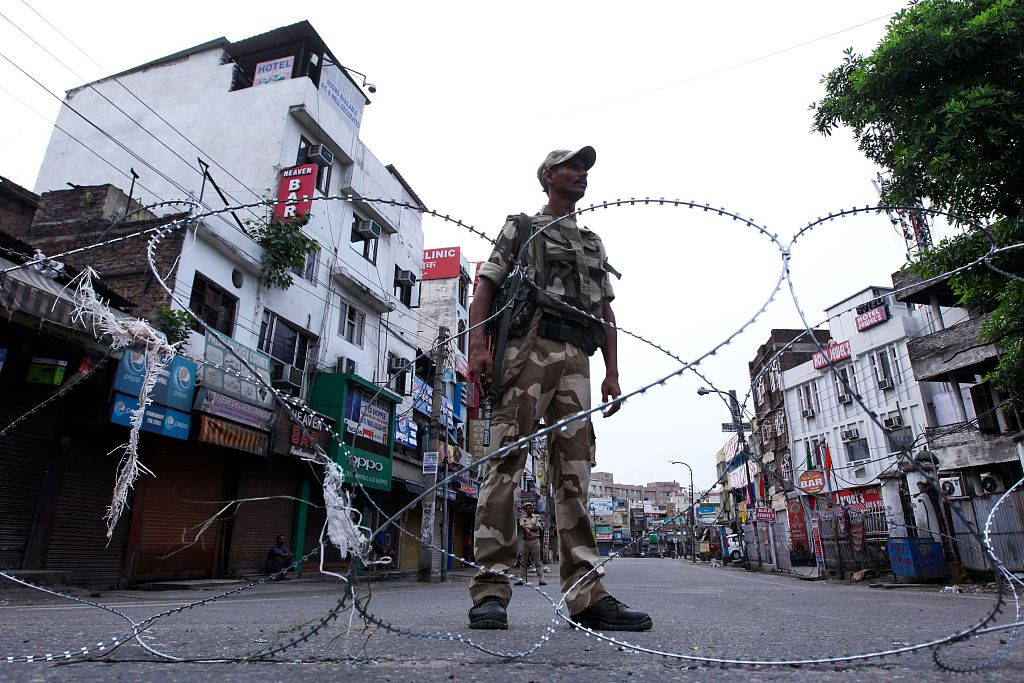
Security personnel stands guard on a street in Jammu, August 6, 2019. /VCG Photo
Some view the revocation as a statement of intent by the Modi government, a symbol of its power after this year's election success and an indication of the blunt decisions the BJP may be willing to take to reshape the country's future.
"Through the means of this great and historic house, I am going to become part of ongoing process of nation building," Shah said during his maiden speech as a parliamentarian in the upper house on February 2018.
"I have known Amit Shah for 16 years I don't think there's a more proactive leader," Shaina NC, spokesperson of the BJP, told CGTN Digital. "The political will that he has shown in scrapping Article 370 is something leaders in the past only talked about."

BJP President Amit Shah (L) and former opposition Congress President Sonia Gandhi (R) during Dussehra celebrations in New Delhi, October 22, 2015. /VCG Photo
Operating as a representative in state politics and in the background for many years, he has only reached national prominence over the past decade. But his backstory is filled with intrigue and controversy. Shah has been associated with the Rashtirya Swayamsevak Sangh (RSS), BJP's ideological parent, since his teens. He met PM Modi in Ahmedabad, Gujarat, in 1982 through RSS circles.
Popular Indian psephologist Devenda Kumar in an article published in 2017 in The Economic Times revealed: "Himself [Shah] a booth worker in initial days, he took up the challenging task of registering all BJP workers manually when Narendra Modi was the organization secretary of Gujarat."
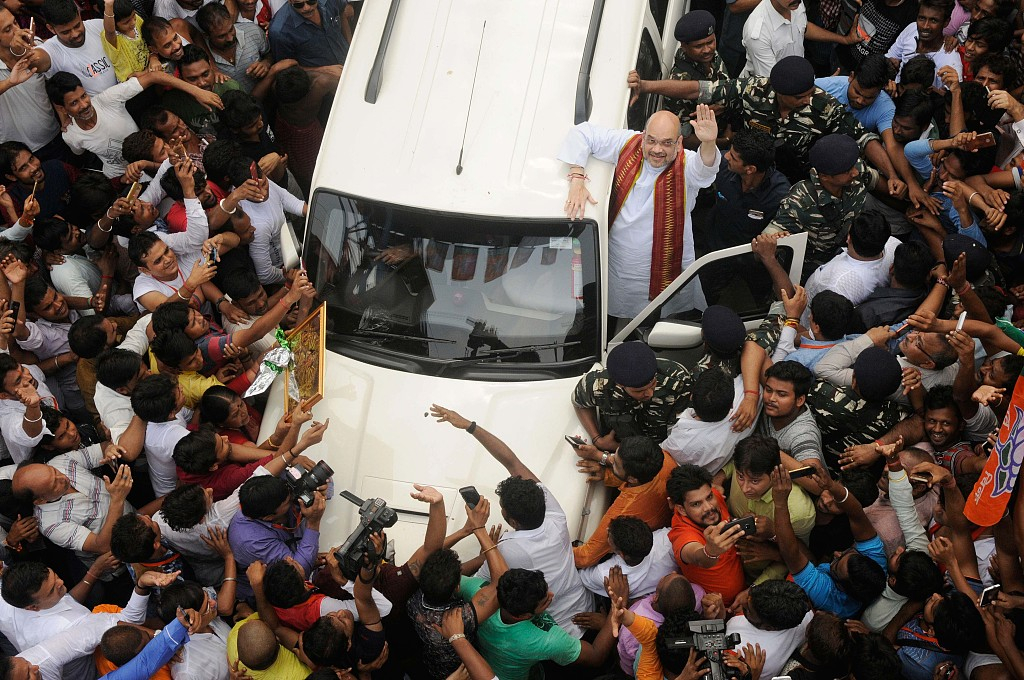
Amit Shah, BJP President and Indian Home Minister, visits the house of a BJP worker in Kolkata, West Bengal, September 13, 2017. /VCG Photo
Since 1989, Shah has fought 29 elections and lost none to this day. He worked alongside Modi in the 1990s to help build the BJP into a force in Gujarat, where Modi went on to make his name during 14 years as chief minister. In the 2019 lower house elections, Shah contested Gandhinagar, Gujarat and won it with a margin of 557,014 votes.
In his article Kumar described Shah as "a strict vegetarian, non-smoker, teetotaler" and someone who "remembers both friends and adversaries and knows most party workers by name."
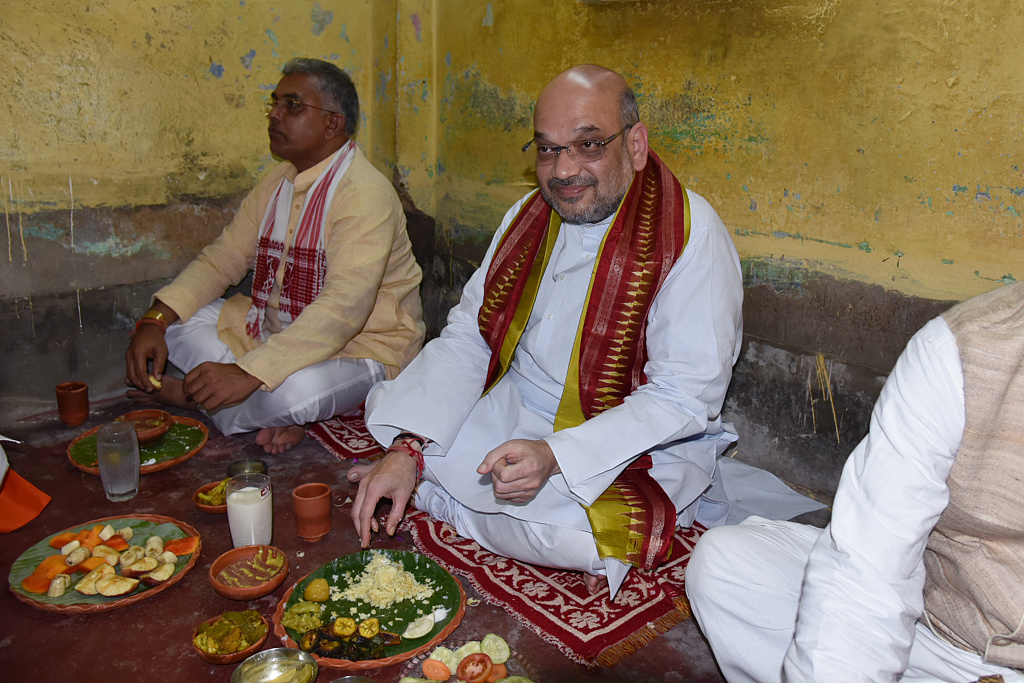
Amit Shah (R), BJP President and Indian Home Minister, takes his lunch at a party worker's house in Kolkata, West Bengal, September 13, 2017. /VCG Photo
Shah, who is 14 years junior to his mentor PM Modi, has been decisive in driving the nationalist agenda of the BJP-led Modi government. "Strident Hindutva and muscular nationalism are the core principles he has pursued relentlessly and unapologetically. While his critics may accuse him of being a divisive figure, making communal remarks and practicing the politics of polarization, Shah unabashedly wears his brand of fiery Hindutva on his sleeve," Khanna said.
Rana Ayyub, senior Indian journalist and author of "Gujarat Files: Anatomy of Cover up," wrote in The Washington Post: "In 2001, a few years after his arrival, Modi became chief minister of Gujarat with the help of Shah.
"Shah's mission was to thwart all trouble that came Modi's way… Since that time, Shah has only grown more powerful. He is one of the most divisive and hateful politicians in India. He has told audiences that a vote against the BJP will be celebrated in Pakistan."
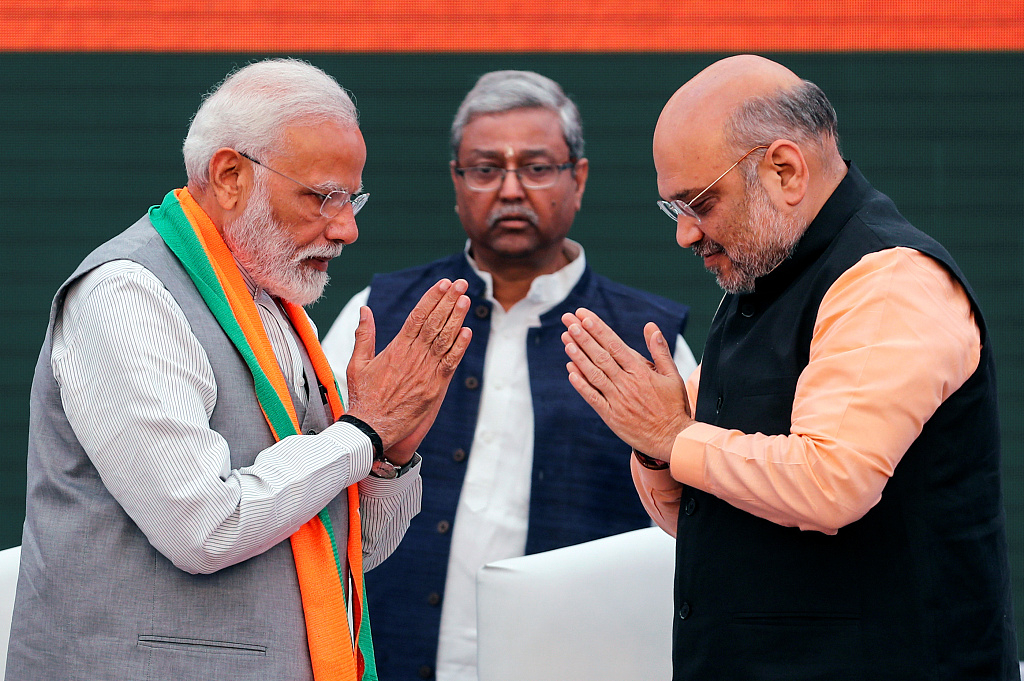
Indian Prime Minister Narendra Modi and BJP President Amit Shah greet each other before releasing their party's election manifesto for the April/May general election in New Delhi, April 8, 2019. /VCG Photo
In 2010, Shah, then home minister of Gujarat state, was arrested by the Central Bureau of Investigation (CBI), on allegations of masterminding a fake encounter involving gangster Sohrabuddin Shaikh, his wife Kausar Bi and an eyewitness in the case. However, in 2018, a special CBI court acquitted Shah after observing that the prosecution failed to establish a case against him.
Shah was also accused by the opposition Congress party of plotting to kill a judge who was hearing the case, but the Supreme Court of India in April 2018 ruled that the judge had died of natural causes. In 2004, Shah was accused of links to an encounter involving Ishrat Jahan, a 19-year-old college student, along with three others. The four were alleged to be terrorists on a mission to kill Modi. In 2014, the CBI gave him a clean chit (certificate of exoneration) in the case.
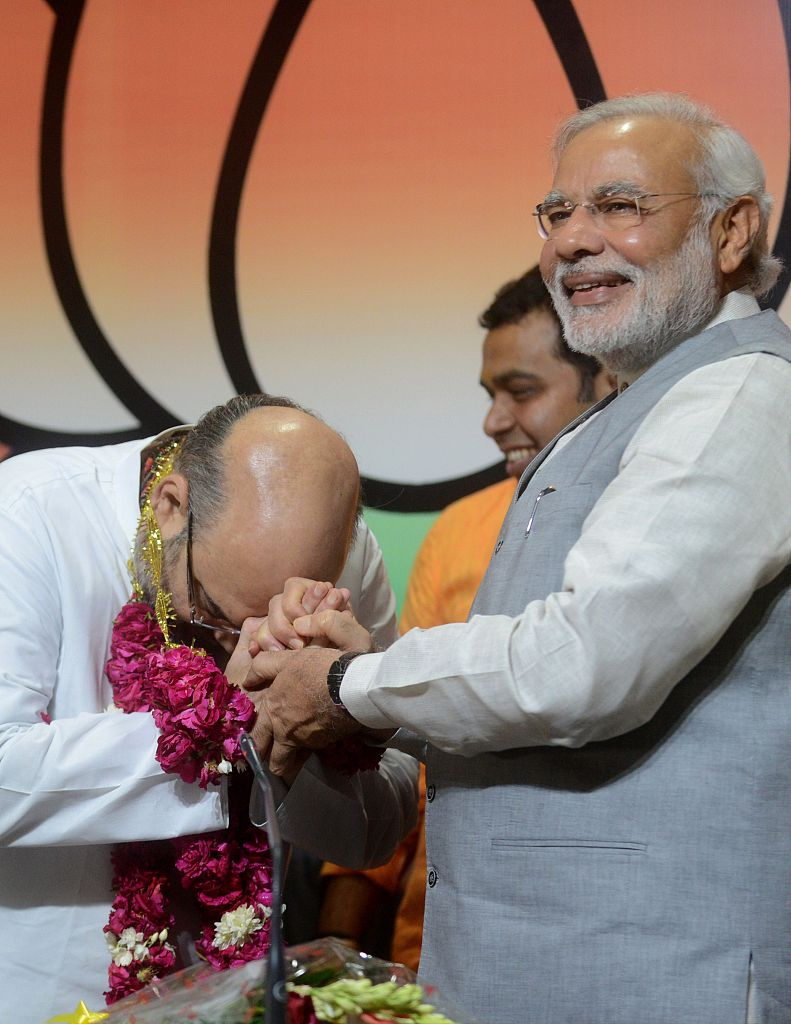
Amit Shah greets Indian Prime Minister Narendra Modi during his appointment as the BJP's new president in New Delhi, July 9, 2014. /VCG Photo
But these controversies have not stopped Shah from reaching the top echelons of his party and Indian politics. Shah's prominence – the fact that he has owned the Kashmir move alongside Modi – is not only a sign of his growing influence within the government, but has prompted many to suggest he is a prime minister-in-waiting.
"He's already emerged as the de facto No. 2 in the Modi government, eclipsing other senior ministers. And yes, many do see his as PM Modi's successor — someone who could possibly take on the mantle in the middle of the next term of this government, if they return to power in 2024. Of course it is only in the realm of speculation. But such is the impact of his very presence in the government that people are already talking about this possibility," Khanna said.
As the world waits to see how the situation in Kashmir plays out, Shah's future is also in focus.
"The story of the 53-year-old modern-day Chanakya is still unfolding," Kumar wrote in 2017. "The country will see many more of his unseen aspects than just an election machine in the coming months and years."
Cover graphic by Du Chenxin

Copyright © 2018 CGTN. Beijing ICP prepared NO.16065310-3
Copyright © 2018 CGTN. Beijing ICP prepared NO.16065310-3